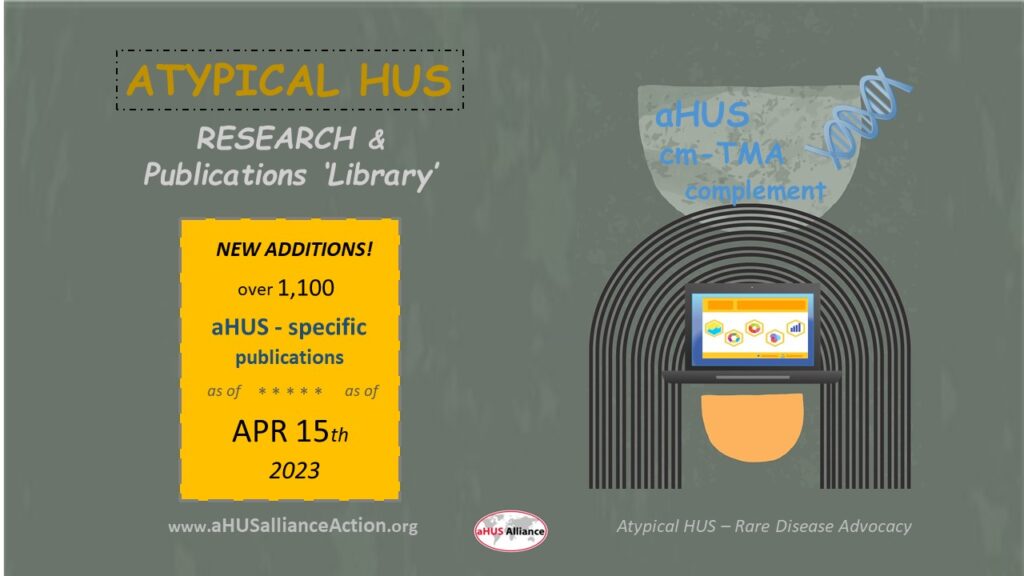
It’s exciting to report that in the first months of 2023 there’s been a raft of new publications which are important to those affected by aHUS, and especially key to the medical professionals who treat them.
This article highlights a small selection of new aHUS research from various topics of high interest released since Rare Disease Day (28 Feb 2023), but there are more than 3 dozen recently added to our Research & Publications page. The ‘New Research’ scroll heads this resource, created so that readers can easily access many of the main aHUS publications which have been released over this past year. Those interested into a ‘deep dive’ into a specific interest area will find multiple years of aHUS research on scrolls categorized by these topics: Critical Care, Thrombotic Microangiopathy (TMA), Extra Renal: Effects on the Body, Pregnancy, Transplants, Genetics, Research in Specific Nations, Case Studies, Complement, Patient Registry: Publications, Drug discovery/Research, Summary articles/Literature Reviews, Consensus Documents/Guidelines, Secondary aHUS, Triggers, Treatment, Diagnosis, and Varied Topics (other).
Underlying themes in many of them underscore continued difficulty with diagnosis, treatment considerations and disease management, and a lack of drug access in many nations. While many readers are aware that atypical HUS is an ultra rare disease, did you know that aHUS is considered a complement-mediated TMA? Research relevant to aHUS can be found under the headings of rare diseases, TMA, complement, and more – and the variety of terminology can make finding information difficult. We invite you to visit our Atypical HUS Resources index to learn more about how these research topics directly affect aHUS patients and guide their clinical care.
Atypical HUS may cause damage to any Organ
Two recent publications are targeted toward the hematology community, underscoring that the tiny clots associated with aHUS activity can occur anywhere in the body. A Hematologist (trained extensively in blood-related conditions and diseases) may be the primary specialist for aHUS diagnosis and care, in addition to nephrologists (who diagnose and treat medical concerns related to the kidneys). The complement system and its activation, as part of our immune system, is key for researchers interested in development of new therapeutic drugs with potential to treat aHUS.
Among new research we’ve added this month to our “Pregnancy” scroll is a recently published case study about aHUS in pregnancy which was very aptly subtitled “something wicked this way comes”. We’d like to draw attention to the multi-disciplinary aspects of this particular pregnancy publication noted below, which moved from initial diagnostic issues to focus on maternal fetal health concerns in two settings: delivery room (specifically, for obstetric anesthesiologists) and within the intensive care unit. Published in the BMC Anesthesiology journal, this article underscores the need to establish more interdisciplinary, thrombotic microangiopathy care teams at hospitals and in other clinical care settings.
Anna Duval and Véronique Frémeaux-Bacchi Complement biology for hematologists
Thomas et al. The Use of Eculizumab for the Treatment of Atypical Hemolytic Uremic Syndrome in an Academic Hematology Center
Thomas K et al. The Use of Eculizumab for the Treatment of Atypical Hemolytic Uremic Syndrome in an Academic Hematology Center
Regarding Complex Care in aHUS Pregnancy
Catarci S et al. A case report of an atypical haemolytic uremic syndrome in pregnancy: something wicked this way comes
Potential new Therapeutic Drugs
Atypical HUS is one a a group of disorders called thrombotic microangiopathies (TMAs) which exhibit common symptoms that center on damage to small blood vessels, with aHUS patients most often experiencing in negative impact on kidney function. Continuing with the above theme on the importance of complement research for possibilities in the arena of drug research and development:
Anuja Java and Alfred H.J. Kim The Role of Complement in Autoimmune Disease-Associated Thrombotic Microangiopathy and the Potential for Therapeutics
Treatment for any drug needs to consider some basic parameters, among them: drug safety and efficacy, treatment costs and global access, and the drug’s impacts on patient Quality of Life. Recent research in the aHUS space addresses these areas, so we note 3 here: new publications from the Dutch research team (ter Avest et al); PTSD and Quality of Life issues for patients who were in the ICU; and the innovative consideration of lufaxin, which occurs in nature as the sand fly salivary protein.
Anderson J et al. A bispecific inhibitor of complement and coagulation blocks activation in complementopathy models via a novel mechanism
Ter Avest M et al. Proposal for individualized dosing of eculizumab in atypical haemolytic uraemic syndrome: patient friendly and cost-effective
Note: On the topic of ‘Horizon Scanning’ for future drug candidates, our therapeutic drug overview & pharma pipelines chart may be viewed at https://bit.ly/aHUS2022drugReview
aHUS Diagnosis & Treatment – Key Info
Atypical HUS families can look at this new publication as a ‘roadmap’ that front line physicians and urgent care centers can use to diagnose and treat patients suspected to have a form of thrombotic microangiopathy. Since there’s no single test to distinguish aHUS apart from other conditions with similar clinical presentations, expert opinion and guidelines are critical for patients to receive accurate diagnosis leading to rapid and appropriate treatment.
Our Research & Publications page has 4 scroll topics related to overviews of guidelines and summaries specific to aHUS care: Diagnosis, Treatment, Summary Articles & Literature Reviews, and Consensus Documents & Guidelines. (Some are cross-referenced across scroll categories)
Fakhouri F, Schwotzer N, and Frémeaux-Bacchi V.
How I diagnose and treat atypical hemolytic uremic syndrome
Questions about the aHUS Research & Publications page, to include suggestions for inclusion of additional aHUS studies and research articles, can be directed to the page curator E: linda@ahusallianceAction.org
Are you staying current with aHUS research & News?
We invite you to subscribe to our free newsletter, The aHUS Global Advocate

For More about our Newsletter & reasons to Stay Connected
Newsletter Landing Page: https://bit.ly/aHUSglobalNewsletter
Click Here to Sign Up and Receive our Newsletters

